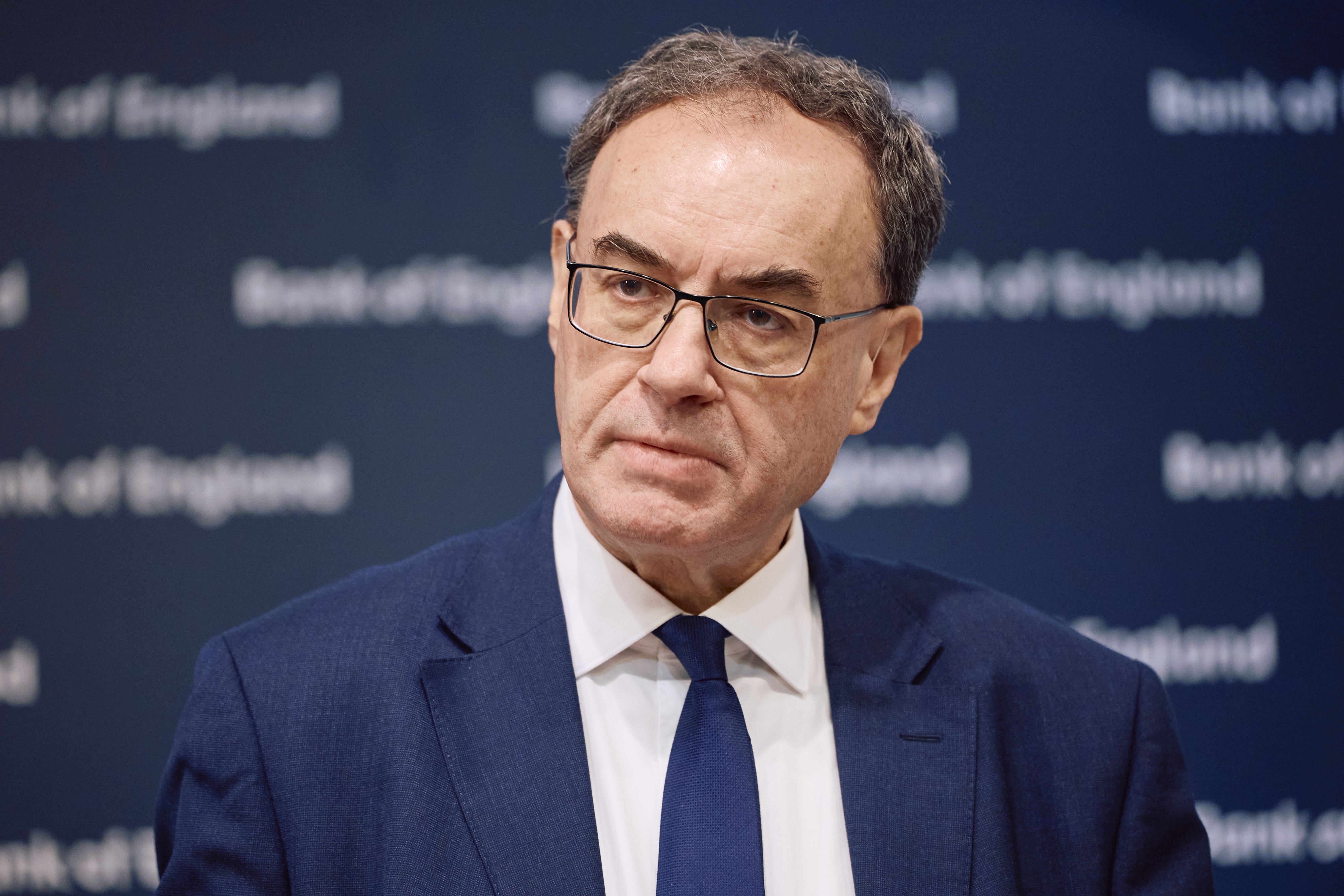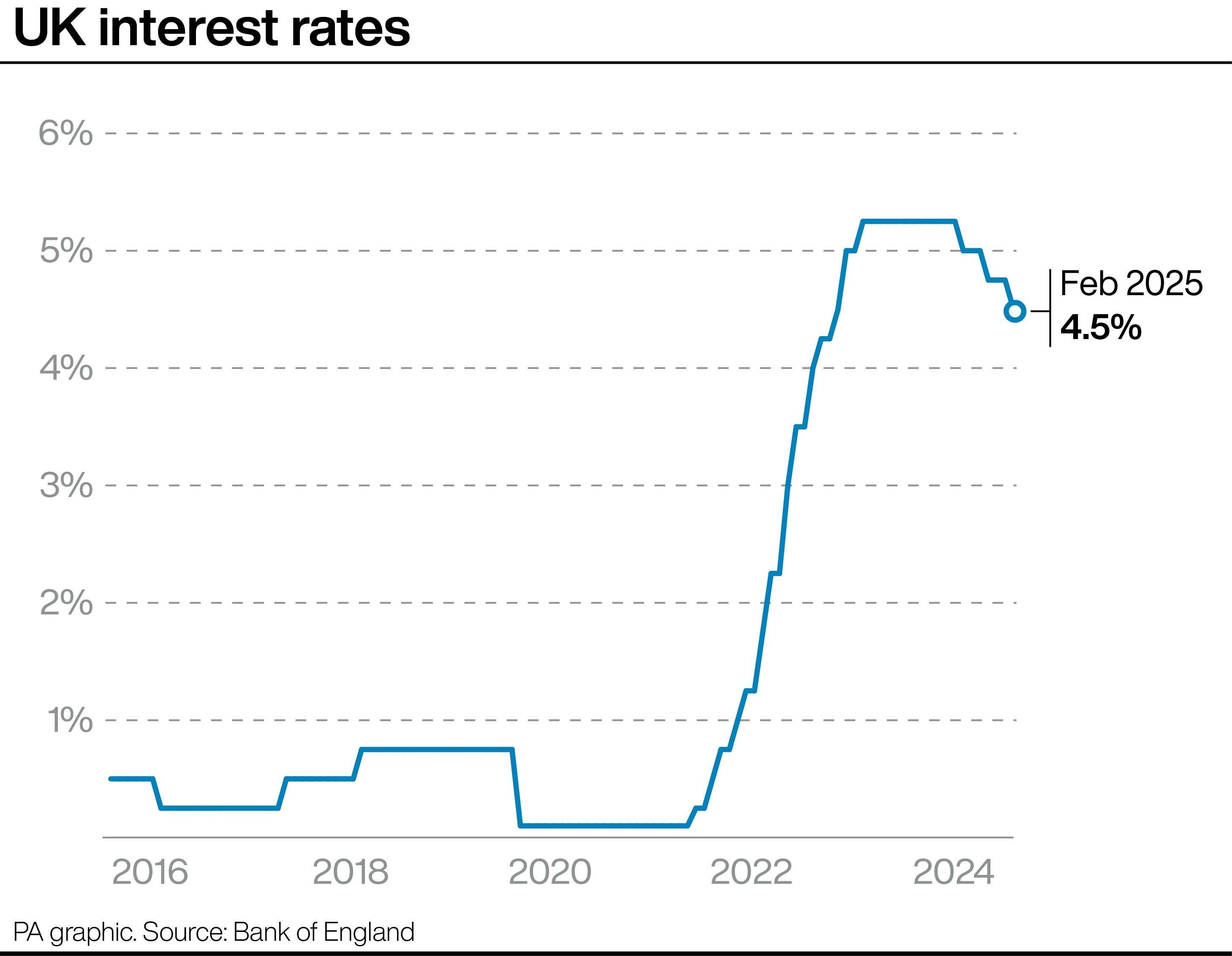Rachel Reeves has been dealt a further blow in her bid to fulfil Labour’s primary mission of reigniting economic growth, as a downgraded forecast overshadowed news of an interest rate cut.
The Bank of England has halved its projections for growth this year because of the impact of the chancellor’s autumn Budget, and inflation is now expected to rise higher than previously estimated, to 3.7 per cent.
The Bank also warned that more people will be out of work, as firms swallow higher taxes and an increase to the minimum wage.
Ms Reeves, whose future as chancellor is being questioned over her record in the first seven months of the Labour government, was warned the “putrid” new growth forecast “needs to be a wake-up call”.
However, she got a much-needed boost as the Bank announced a cut in interest rates from 4.75 per cent to 4.5 per cent. As well as providing relief for businesses, the cut will help thousands of people with mortgages who will see their monthly payments fall. A homeowner with a £300,000 tracker mortgage will see monthly repayments fall around £43 from £1,710 to £1,667.

It was the first piece of good news in some time for a chancellor who has been beset by poor economic figures since taking office.
That trend continued on Thursday as the Bank downgraded its growth forecast for the UK economy to 0.75 per cent for this year, down from previous estimates of 1.5 per cent, before accelerating again in 2026 and 2027. It projects that GDP fell 0.1 per cent in the fourth quarter of 2024 and will rise by just 0.1 per cent in the first quarter of 2025.
Paul Johnson, director of the Institute for Fiscal Studies (IFS), called the update a “pretty pessimistic forecast”.
“Office of Budget Responsibility (OBR) is generally much more optimistic than the Bank, but if it moves in a similar direction that will spell trouble for the chancellor,” he wrote.
In his assessment, Bank governor Andrew Bailey warned that US trade tariffs, even if not imposed directly on the UK, could hit growth.
“If there were to be tariffs that contributed to a fragmentation of the world economy, that would be negative for growth for the world economy. I hope that doesn’t happen, but that could happen,” Mr Bailey said.
It follows Ms Reeves’s major speech last week when she doubled down on her economic growth agenda in a bid to relaunch her economic plan with proposals to unleash massive building projects including a new runway at Heathrow Airport.
Downing Street backed the chancellor, repeating a pledge that she will stay in the role for the whole of this parliament.
The prime minister Sir Keir Starmer said households would have “more money in their pockets” as he welcomed the rate cut – the third drop in interest rates since July.
“That’s good news because for many people watching this it means they will have more money in their pockets,” he said. “Wages are going up higher than inflation, so again people feel better off. The minimum wage has gone up.”
He added: “We are absolutely determined we are going to grow the economy, and I don’t mean a line on a graph, I mean people feeling better off.”
But shadow chancellor Mel Stride said that while the cut in interest rates “will be welcome news” for families and businesses he warned the Bank of England’s weaker-than-expected growth predictions showed “confidence is falling and Labour’s Budget is fuelling inflation”.
Labour’s “disastrous Budget is likely to mean fewer rate cuts this year than previously anticipated”, he added.
Liberal Democrat Treasury spokesperson Daisy Cooper said the new growth forecast should be a “wake-up call for the chancellor” and called on her to scrap her “misguided national insurance hike” on employers and drop her refusal to “negotiate a bespoke UK-EU Customs Union”.
Anna Leach, chief economist of the Institute of Directors, urged Ms Reeves to reconsider “additional burdens” placed on businesses last year, in particular “pernicious tax changes affecting family firms, farms and non-doms” and employment regulations.
Budget measures have “significantly undermined” business momentum “and will affect levels of private investment for years to come”, she said, and the forecasts presented a “worrying outlook for the UK” in which “stagflation risks remain on the table”.
The Bank’s rate setting Monetary Policy Committee (MPC) voted by 7 to 2 to bring rates down. Two members of the MPC voted for a bigger 0.5 per cent cut.

TUC general secretary Paul Nowak said: “This rate cut is badly needed to help lift the economy out of stagnation. Lower borrowing costs will ease pressures on households, helping families with their weekly budgets and leaving them with more to spend. And it will make it more affordable for businesses to invest and grow.”
Alpesh Paleja, deputy chief economist, CBI, said the move “reinforces our view of a gradual loosening in monetary policy over this year”.
But he warned: “The Monetary Policy Committee are increasingly having to balance conflicting objectives. The CBI’s surveys show that business growth and hiring expectations have weakened. But inflation expectations are picking up, exacerbated by the rise in employment costs arising from October’s Budget. Therefore, while we still expect a few more rate cuts this year, risks to this forecast are now balanced in either direction.”
Downing Street insisted that Budget spending on the NHS was “good for the economy and good for growth” and pointed to the latest forecast by the OBR that inflation will remain close to the target of 2 per cent.
Source link
 Unews World
Unews World
